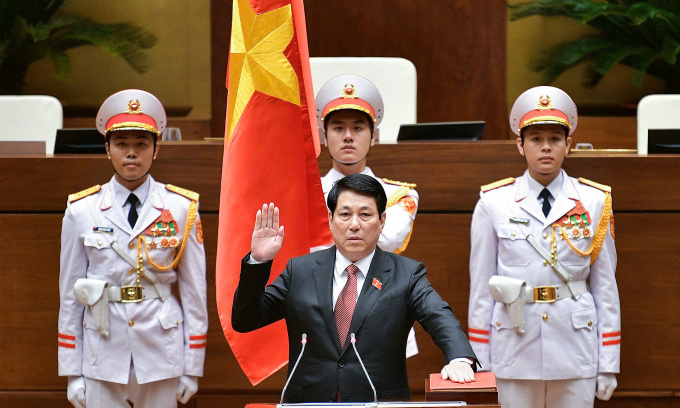Vietnam Party Secretariat’s Standing Member becomes State President
General Cuong was elected to the position with 100% of the 440 votes from National Assembly deputies.
Taking the oath of office, he said: “I, Luong Cuong, President of the Socialist Republic of Vietnam, solemnly swear to remain absolutely loyal to the Fatherland, to the people, and to the Constitution of the Socialist Republic of Vietnam; and to strive to fulfill the tasks entrusted to me by the Party, the State, and the people.”
President Luong Cuong takes the oath of office at a National Assembly session in Hanoi, Oct. 21, 2024. Photo by Read/Hoang Phong |
Cuong, 67, from the northern province of Phu Tho, is a member of the Party Central Committee for the 11th-13th terms, Secretary of the 12th Party Central Committee, and member of the 13th Politburo.
He joined the army in 1975 and worked for many years in Military Region 2. He served as Political Commissar of Army Corps 2, Political Commissar of Military Region 3. In 2011, he held the position of Deputy Director of the General Political Department of the People’s Army of Vietnam and 5 years later became Chairman of the General Department of Politics.
In January 2019, he was promoted to general, becoming the 15th person to hold the highest military rank of the Vietnam People’s Army.
On May 16, Cuong was assigned by the Politburo to be the permanent member of the Secretariat, replacing his predecessor, Truong Thi Mai, who resigned upon personal wishes.
 |
Vietnam's President Luong Cuong. Photo by Read/Hoang Phong |
According to Vietnam’s 2013 Constitution, the president is the head of state, representing the Socialist Republic of Vietnam in domestic and foreign affairs.
The president has duties and powers prescribed by the Constitution such as: announcing the Constitution, laws, and ordinances; propose to the National Assembly to elect, relieve from duty, and dismiss vice presidents and prime minister; based on the resolution of the National Assembly, appoint, dismiss, dismiss deputy prime ministers, ministers and other members of the government.
The president also has the authority to propose to the National Assembly to elect or dismiss, and dismiss the Chief Justice of the Supreme People’s Court and the Director of the Supreme People’s Procuracy; make amnesty decision; based on the resolution of the National Assembly, announce the general amnesty decision.
The president is the leader of the people’s armed forces, holding the position of Chairman of the National Defense and Security Council; having the authority to confer, promote, demote, and strip military ranks of general, rear admiral, vice admiral, and naval admiral; appoint, relieve from duty, and dismiss the Chief of General Staff, Chairman of the General Political Department of the Vietnam People’s Army.


Comments are closed.